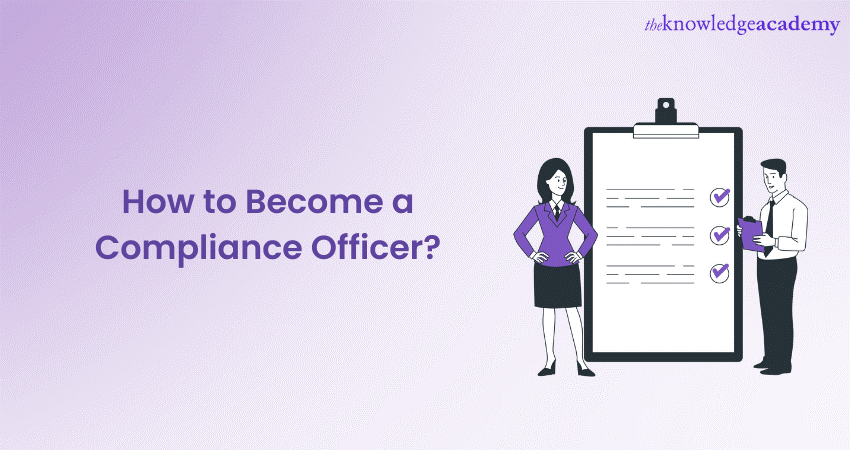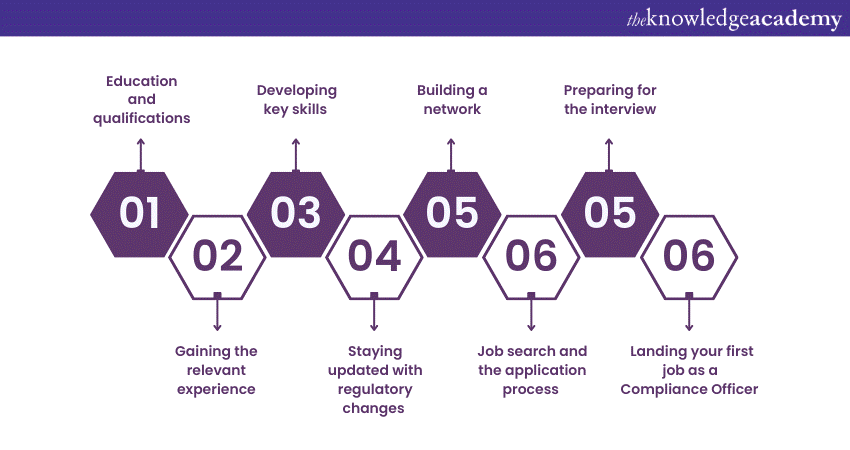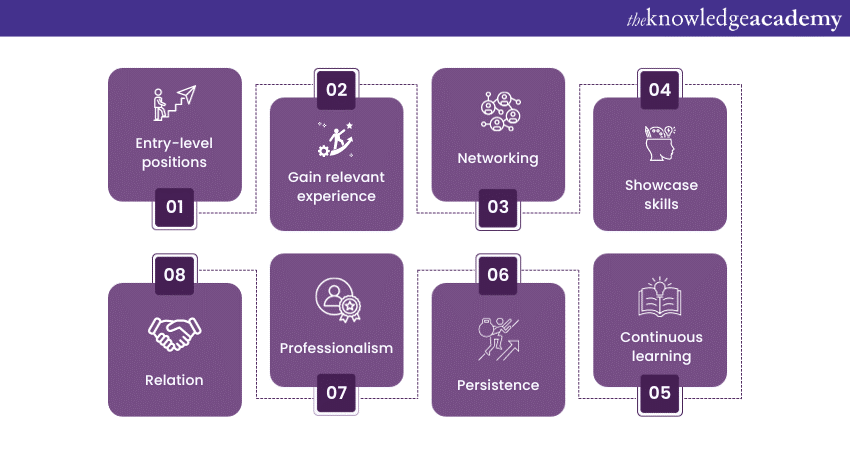We may not have the course you’re looking for. If you enquire or give us a call on +27 800 780004 and speak to our training experts, we may still be able to help with your training requirements.
Training Outcomes Within Your Budget!
We ensure quality, budget-alignment, and timely delivery by our expert instructors.

Professionals with an eye for detail, ethical values, and a desire to ensure organisational operation within legal frameworks, will find the profile of a Compliance Officer very rewarding. But do you know How to Become a Compliance Officer and what are the steps involved? Let’s find out!
According to Indeed, A Compliance Officer is paid an average of 34,204 GBP annually in the UK. The same report reveals that London and Blackburn are the highest paying cities for Compliance Officers. With such a high payscale of prospective job skeekers often enquire how to enter this field. This blog will explain How to Become a Compliance Officer, discover the qualifications needed to become an officer and provide information on career paths.
Table of Contents
1) Understanding the role of a Compliance Officer
2) Exploring the various steps to Become a Compliance Officer
a) Selecting specialisation
a) Education and qualifications
b) Gaining the relevant experience
c) Developing key skills
d) Staying updated with regulatory changes
e) Building a network
f) Job search and the application process
g) Preparing for the interview
h) Landing your first job as a Compliance Officer
3) Conclusion
Understanding the role of a Compliance Officer
A Compliance Officer plays an important role in ensuring that organisations adhere to legal and regulatory requirements. If you're wondering How to Become a Compliance Officer, it involves obtaining the necessary qualifications and gaining relevant experience in the field.
Additionally, Compliance Officers are responsible for implementing Compliance programs, conducting risk assessments, monitoring activities, and providing guidance to employees. Their primary focus is to ensure that organisations operate within the boundaries of the law and maintain high ethical standards.
Furthermore, the role of a Compliance Officer includes managing internal policies, identifying and mitigating Compliance risks, and keeping up with regulatory changes. They work closely with various departments to establish and enforce best practices. A Compliance Officer's duties may also involve conducting audits, investigating potential breaches, and reporting findings to senior management.

Exploring the various steps to become a Compliance Officer
In now, let’s explore How to Become a Compliance Officer with detailed steps. The following are the steps involved:

Step 1: Selecting specialisation
Compliance Officers play a pivotal role in confirming that various businesses and industries follow the relevant rules and standards. Different industries have different requirements and expectations, so it is beneficial to decide on an area of expertise early on. Some of the most common industries that hire Compliance Officers are as follows:
1) Manufacturing
2) Public sector
3) Finance
4) Healthcare
Compliance Officers can also focus on specific domains, such as environmental Compliance or corporate Compliance.
Step 2: Education and qualifications
Most employers prefer candidates holding a bachelor's degree in business, finance, accounting, or any related field. A degree in Law or a master's degree in Compliance can also provide a competitive advantage.
Additionally, obtaining relevant certifications such as Effective Compliance Training and Business Ethics Training can enhance prospects in this field. Strong educational foundations coupled with specialised certifications demonstrate a commitment to compliance and a comprehensive understanding of regulatory frameworks. Here are the two certifications briefly described as follows:
a) Effective Compliance training: The course significantly improves the confidence of individuals to introduce themselves to be able to work with international organisations and land many job opportunities with high-earning potential. Additionally, the curriculum covers important topics such as the core elements of a Compliance program, and the policies and procedures to measure the program’s effectiveness.
b) Business ethics training: The course helps individuals determine the appropriate behaviour, profits and growth of any business. Individuals are taught to manage their company to promote a culture of integrity among their team members and gain their investors’ trust.
These qualifications equip individuals with the knowledge and skills required to effectively navigate the complexities of Compliance. They also ensure that organisations operate within legal and ethical boundaries.
Learn to promote integrity across your organisation, by signing up for the Business Ethics Training course now!
Step 3. Gaining the relevant experience
Internships are a practical way for students to gain valuable experience in different businesses and industries before entering the job market. They also help students explore their career interests and preferences. Internships can range from both full-time to part-time and from paid to unpaid.
Interns can expect to learn various aspects of the job, depending on the company and the role. They can be involved in learning software tools, documenting policies and procedures, conducting research, or assisting managers with specific projects.
Besides internships, new graduates can also start their careers in the field by getting trained on the job. Graduates with bachelor’s degrees can work for a few years in client support and analysis roles at a company and then transition to the Compliance department.
Step 4: Developing key skills
Developing the key skills is essential for success as a Compliance Officer. Strong analytical and problem-solving abilities are vital for identifying and addressing Compliance issues effectively. Additionally, excellent communication and interpersonal skills enable Compliance Officers to effectively communicate policies, train employees, and collaborate with stakeholders.
Furthermore, attention to detail is vital for ensuring regulatory Compliance and conducting thorough audits. The ability to work independently and make sound judgments allows Compliance Officers to navigate complex situations with integrity. A solid understanding of regulatory frameworks, compliance best practices, and risk management principles is also important.
Step 5: Staying updated with regulatory changes
Staying updated with regulatory changes is a critical aspect of being a Compliance Officer. The Compliance landscape is dynamic. With new laws, regulations, and guidelines being introduced regularly, Compliance Officers must stay informed about these changes, to ensure that organisations remain compliant.
Additionally, Compliance Officers can proactively adapt Compliance programs, implement necessary changes, and ensure adherence to the latest regulatory requirements. Continuous learning and awareness allow Compliance Officers to mitigate risks, maintain Compliance, and protect the reputation of the organisations they serve.
Learn how to become compliant according to law and regulation, by signing up for the Compliance Training courses now!
Step 6: Building a network
Building a strong professional network plays a significant role in a Compliance Officer's career growth and success. Joining industry-specific associations and actively participating in networking events allows Compliance Officers to connect with other professionals in the field.
Additionally, engaging in discussions, sharing experiences, and seeking mentorship opportunities can provide valuable insights and guidance. Networking opens doors to new job prospects, fosters collaboration, and enhances professional reputation.
Moreover, a strong network enables Compliance Officers to stay updated with industry trends, exchange best practices, and navigate challenges more effectively.
Step 7: Job search and the application process
The job search and application process for a Compliance Officer can be summarised as follow:
a) Research: Conduct thorough research on job boards, professional networking platforms, and company websites to find Compliance Officer positions.
b) Tailor application materials: Customise your resume and cover letter to highlight relevant skills, experiences, and understanding of Compliance regulations.
c) Application submission: Follow the instructions provided by the employer and submit your application through the designated platform or email.
d) Interview preparation: Research the organisation, practice answering common Compliance related interview questions, and dress professionally.
e) Interviews: Attend interviews that may include behavioural and technical questions, showcasing your knowledge and problem-solving abilities.
f) Follow-up: Send a thank-you email or letter after the interview to express your gratitude and reiterate your interest in the position.
g) Job offer: If selected, carefully review the job offer, negotiate terms if necessary, and accept the position.
h) Onboarding: Complete any required documentation, attend orientation sessions, and familiarise yourself with the organisation's compliance policies and procedures.
Learn the techniques of job searching and document preparation, by signing up for our Job Searching Masterclass now!
Step 8: Preparing for the interview
Preparing for a Compliance Officer interview can be simplified into the following points:
a) Research the organisation: Gain a thorough understanding of the organisation's industry, products/services, and compliance-related challenges they may have faced.
b) Review regulatory requirements: Familiarise yourself with relevant laws, regulations, and industry standards applicable to the organisation.
c) Highlight relevant experience: Prepare examples from your experience that demonstrate your ability to manage compliance programs, conduct risk assessments, and handle compliance-related issues.
d) Practice common interview questions: Prepare responses to common Compliance related interview questions, showcasing your knowledge, experience, and problem-solving skills.
e) Dress professionally: Choose appropriate attire that reflects professionalism and respect for the interview process.
f) Demonstrate confidence: Maintain eye contact, speak clearly, and exhibit confidence in your responses.
g) Ask questions: Prepare thoughtful questions about the organisation's compliance practices, culture, and opportunities for growth.
h) Follow-up: Send a thank-you email or letter after the interview to express your appreciation and reiterate your interest in the position.
i) Stay calm and focused: Practice relaxation techniques to stay calm and focused during the interview, allowing your skills and knowledge to shine.
j) Be yourself: Show your genuine interest in the role, exhibit enthusiasm, and let your personality shine through.
Learn to present yourself professionally in an interview, by signing up for the Interview Skills Training course now!
Step 9: Landing your first job as a Compliance Officer
Landing your first job as a Compliance Officer requires a strategic approach and determination. Here are some key factors to consider:

a) Entry-level positions: Consider starting in entry-level roles, such as Compliance Analyst or assistant, to gain practical experience and learn the ropes.
e) Continuous learning: Stay updated with industry trends, attend training programs, and obtain relevant certifications to enhance your skills and marketability.
f) Persistence: Stay determined and continue applying for suitable positions, leveraging your network and showcasing your passion for compliance.
g) Professionalism: Demonstrate professionalism, integrity, and a commitment to ethical practices throughout the job search process.
h) Seize opportunities: Once in the role, be proactive, take on additional responsibilities, and demonstrate your value to advance your career as a Compliance Officer.
Conclusion
The road to Becoming a Compliance Officer requires a combination of education, practical experience, and the development of key skills. Aspiring Compliance Officers can pave the way for a successful career, by gaining the relevant qualifications, obtaining practical experience, and continuously staying updated with regulatory change. We hope that after reading this blog, you have understood How to Become a Compliance Officer!
Learn about the techniques of internal control, by signing up for the Security Governance and Compliance Training course now!
Frequently Asked Questions

Compliance is a rewarding career that offers both financial and personal satisfaction. Besides high pay and perks, Compliance Officers also enjoy the chance to create a positive impact on their organisations and society by ensuring ethical and legal conduct.

To succeed as a Compliance Officer, you need to have a combination of skills, knowledge, and attitude. You also need to have a thorough understanding of the regulatory guidelines and security policies that apply to your industry and organisation. Additionally, you need to have a strong sense of integrity, professionalism, and accountability and be willing to learn.

The Knowledge Academy takes global learning to new heights, offering over 30,000 online courses across 490+ locations in 220 countries. This expansive reach ensures accessibility and convenience for learners worldwide.
Alongside our diverse Online Course Catalogue, encompassing 17 major categories, we go the extra mile by providing a plethora of free educational Online Resources like News updates, blogs, videos, webinars, and interview questions. By tailoring learning experiences further, professionals can maximise value with customisable Course Bundles of TKA.

The Knowledge Academy’s Knowledge Pass, a prepaid voucher, adds another layer of flexibility, allowing course bookings over a 12-month period. Join us on a journey where education knows no bounds.

The Knowledge Academy offers various Compliance Courses, including Effective Compliance, Security Governance and Compliance and many more. These courses cater to different skill levels, providing comprehensive insights into ISO Compliance Officer roles and responsibilities in general.
Our ISO & Compliance blogs cover a range of topics related to Compliance, offering valuable resources, best practices, and industry insights. Whether you are a beginner or looking to advance your Compliance knowledge, The Knowledge Academy's diverse courses and informative blogs have you covered.







 Top Rated Course
Top Rated Course



 If you wish to make any changes to your course, please
If you wish to make any changes to your course, please


